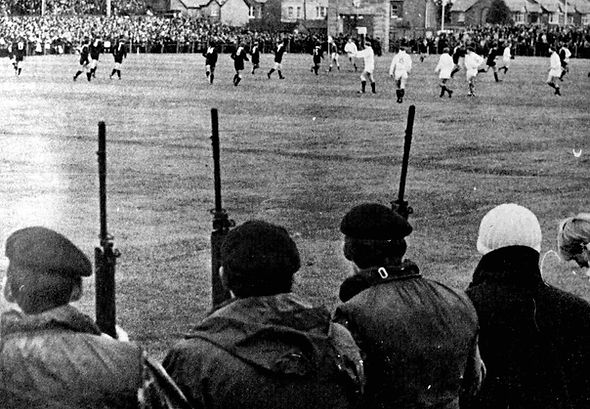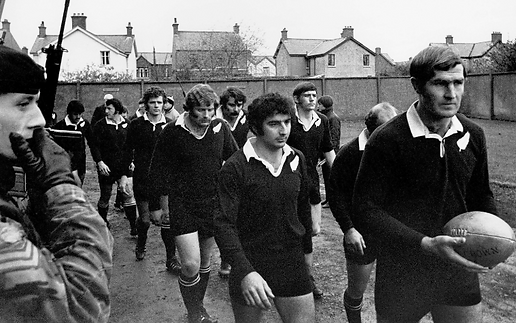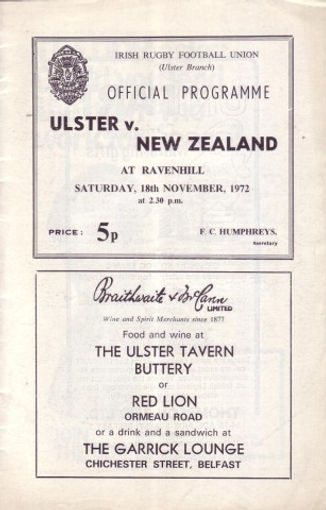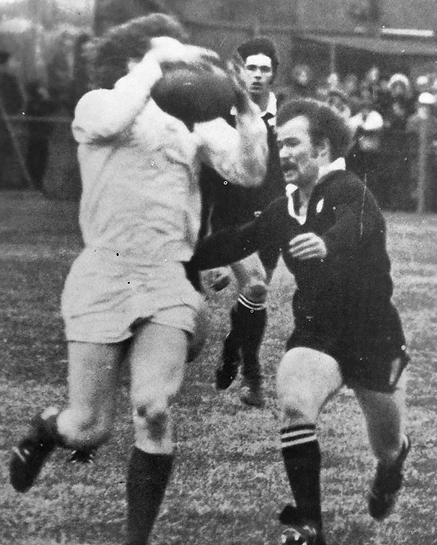
NECTAR & TWIGGY
ULSTER'S BURNING!

On Thursday, November 16th, 1972, The All Black entourage moved quietly out of Dublin, a three hour coach journey to a secret hideout at Dunadry, twenty eight kilometres from the centre of Belfast. The accommodation, in a pleasant country hotel, was first rate and a welcome reprieve from the tumultuous riggers of preceding weeks.
By stark contrast to the couple of Welsh visits thus far, the New Zealanders found that the Irish welcome had some genuine warmth to it, polarised by the cold and miserable weather in County Antrim.
The following morning the team travelled north to the town of Ballymena, in the borough of 'Mid and East Antrim', for a training run in the snow at the Ballymena Rugby Club Ground.
It was the home ground of one of Ireland's most famous rugby son's, one William James McBride, who was also to captain the Ulster province against the All Blacks the following afternoon.
Furthermore, Willie John - as he was more commonly referred to - on the Tuesday before the match, had become W J McBride MBE, the medal and honour personally bestowed on him by her majesty, Queen Elizabeth II.
It was to be a big week for Willie John and on the rugby side of the ledger, the great man was eternally thankful to the men in black, for doing what no other rugby side had done for a three years...travel to and play a match in Belfast.
They have put sport back on the map in Northern Ireland," McBride said after the Ulster clash. " We shall forever be grateful to them. They are wonderful sportsmen."
The All Blacks train in the snow in Ballymena.

Click on any photo
to open the
GALLERY

Sport was one of the victims of the 'Troubles', a violent 30-year hostility, clouded by territorial and religious conflict. Most notably, the refusal of Scotland and Wales to travel to Dublin to play their Five Nations rugby union matches against Ireland, fearing the violence that was sweeping through the North. The NZRFU's decision to stick to schedule and send the All Blacks to Belfast, was warmly received by locals.

30-01-1972. In Londonderry, 13 unarmed civil rights demonstrators are shot dead by British Army paratroopers in an event that becomes known as Bloody Sunday. The killings brought worldwide attention to the crisis in Northern Ireland and sparked protests across the entire nation. On February 2, in Dublin (the capital of independent Ireland), outraged citizens torched the British embassy.
From 1970 to 1972, the political violence in Northern Ireland was at its zenith. The violence peaked during 1972, when nearly 500 people were killed, just over half of them civilians, the worst year of the entire conflict.
The defining point was Bloody Sunday (30 January), when thirteen unarmed men were shot dead by the British Army, at an anti-internment rally in Derry. Fifteen other civilians were wounded. Bloody Sunday greatly increased the hostility of Catholics and Irish nationalists towards the British military and government, while significantly elevating tensions. As a result, the Provisional IRA gained more support, especially through rising numbers of recruits in local areas.
Three weeks before the All Blacks arrived, two Catholic children (aged 6 and 4), were killed in a car bomb attack on a bar in Ship Street, Belfast, where they were playing. A loyalist group calling itself Ulster Freedom Fighters claimed responsibility. Two other people were killed in separate incidents in Belfast, on the same day.
Bryan Williams remembers it as an intense time, bitterly cold and surrounded by loaded machine guns and barbed wire fences, which made for uncomfortable preparations.
"We were confined to our hotels the entire time, security, police escorts, guns, the whole nine yards. I remember about halfway through the first 40, we heard a massive explosion in the distance, pretty scary stuff. It made us all sort of wonder just how important is rugby, really."
Bryan Williams, 'Stuff', Jackson Thomas, 2018
Between hotel and venue, the touring party was escorted by armed police, the players told to keep their heads down as they stepped out off the bus. Bryn Thomas says that 'strict security precautions had been taken at the famous Ravenhill Park ground, which resembled an Army stronghold on Saturday morning'.
The ground was ringed by these armed soldiers, but according to Eddie McIlwaine, in a 2015 article for the Belfast Telegraph, the Army weren't at Ravenhill on duty at all. A patrol of Greenjackets had just ended their tour in the area, when they realised the All Blacks were just across the road, about to be challenged by Willie John and his men.
So as spectators (in uniform), they headed for the stadium in two jeeps, which explains the military presence (according to other eye witness accounts from supporters there at the time). Apparently the soldiers couldn't get their jeeps into the already crammed car park at the ground and had to pick a vantage spot, not far from the dressing rooms, to leave the vehicles and watch the action.
There was a moment of pure emotion at Ravenhill, a few seconds before 2.30pm. A voice came over the public address system, announcing: “Now, ladies and gentlemen, the moment we have all been waiting for, for a long time. Will you please rise and welcome Ian Kirkpatrick and the Seventh All Blacks.”
22,000 spectators put their rugby exile into a full five-minute ovation. Those sitting, stood up. Those standing wished they could get a few feet higher and clap a few decibels louder, such was the warmth of reception. It was not the score or who would win that mattered that Saturday afternoon in Belfast. It was the fact that the match was taking place at all.
As JBG poignantly pointed out; "It brought a touch of sanity back to a scene of tragic conflict. A distraction for some, usually living in fear and terror of the next bomb going off'.
Bryn Thomas also suggested that 'three kiwi 'official' photographers were interrogated for taking photographs'. There are no reports of this, but Peter Bush, who snapped away as the AB's left their dressing room, flanked by armed soldiers, recalled that there had been terrorist threats; "One player from each team would be shot, and in that time and place, the threat was taken very seriously. It was a very long day, and extremely tense".

A patrol of Greenjackets watch the action, as the touring All Blacks play Ulster at Ravenhill. There as security, or there as spectators?
"You cannot imagine what this has really meant to all of us connected with rugby in Ireland, especially Ulster. But until the All Blacks took the field, we couldn't believe the match was on. We will always be grateful to the Seventh All Blacks."
Harry McKibbin, Chairman of the Ulster Rugby Union, 1972.
Match 09: Ravenhill Park, Belfast, November 18th, 1972.
Ulster 6, New Zealand All Blacks 19 (Half-time: 0-9)
For NZL: Hales T, Burgess T. Karam C, 3P.
For ULS: Steele T, Marshall C.
Ulster: Brian Marshall (CIY MS), Harry McKibbin (Instonians), Dick Milliken (Bangor RFC), Alan Goodrich (Queen's University), Joe Myles (Malone), Anthony Harrison (Collegians), Willie Oakes (Instonians), Harry Steele (Queen's University), Stewart McKinney (Dungannon), Willie John McBride (Ballymena) (c), Charlie Murtagh (Portadown), Jimmy Davidson (Dungannon), Paddy Agnew (CIY MS), Ken Kennedy (London Irish), Roger Clegg (Bangor RFC).
New Zealand: Joe Karam, Bryan Williams (r; George Skudder 62'), Duncan Hales, Mark Sayers, Grant Batty, Bob Burgess, Sid Going, Alex Wyllie, Ken Stewart, Hamish Macdonald, Andy Haden, Ian Kirkpatrick (c), Keith Murdoch, Ron Urlich, Jeff Matheson.
Penalties: Ulster 6, New Zealand 14. Lineouts: Ulster 5, New Zealand 24. Rucks: Ulster 12, New Zealand 8. Tightheads: Kennedy 2, Urlich 1. Weather: Cold and wet. Ground: Soft and slippery. Crowd: 22,000. Referee: R F Johnson (England).
The only major disappointment for home fans - after waiting so long to watch a game of rugby - was that their star Irish and British Lion flyhalf, Mike Gibson, had not recovered from a disc lesion suffered a fortnight earlier, when playing for the Cambridge University Past and present team (37) against the Barbarians (14). The match had been played to mark the centenary of Cambridge University's rugby club.
Mike Gibson, along with Stewart McKinney, Jimmy Davidson, Roger Clegg and Harry Steele, would make Ireland's inaugural Oceanic tour in 1976, the first three named playing the test against the All Blacks in Wellington. With tries by Kirky and BJ Robertson, New Zealand won by 11-3 (after leading 11-0 at the break). Four days later Ireland defeated Fiji by 8-0 in Suva.
Hooker, Kevin Kennedy, had made 32 appearances for his country since 1965 and had played in all four tests against New Zealand in 1966. Strong, hard running centre, Dick Milliken, would go to South Africa as a Lion in 1974. Stewart McKinney had earned 3 caps in 1972 and Jimmy Davidson (1942-2007) had earned four caps, the first in 1968.
Tight head prop, Roger Clegg, was regarded a a first class scrummager, similar in stature to 'Mighty Mouse' McLauchlan of Scotland. Harry Steele was a future Irish representative, who would play 10 Internationals between 1976 and 1979.

The seventh All Blacks take the field for their match against Ulster, under the watchful eye of armed guards. (Above) Kirky looks pensive. (At right)...followed by Milt, Clock, Jeff Matheson, Balfour and Keefy.
With the authorities desirous that the All Blacks should arrive safely at Ravenhill, a circuitous route of about 40 miles through the city, via Lisburn, was undertaken.
It was a cold and damp Belfast day, with dull clouds hanging sullenly over the Castlereagh hills. Rain was intermittent throughout the match, especially during the second half, as the weather slowly deteriorated. But such was the occasion, no one at the famous ground was complaining. Willie John and his forward deputy, Ken Kennedy, whipped the home boys into a frenzy before kick off.

Down wind in the first spell, the Ulster pack positively hummed with energy and tore into the All Blacks. They got themselves into a couple of good scoring positions in the early minutes, but 'unpardonable sins' - as JBG put it - prevented them from taking an early lead. Bob Burgess dropped a pass and the fiery flanker, Jimmy Davidson - the outstanding forward in the game - led a charge on the line. Batts failed to pick up the loose ball and both Ulster three-quarters went within inches of scoring. Brian Marshall missed with a penalty attempt.
Bryn Thomas also points out that the AB's, playing into a raw, cold wind and rain, only penetrated the Ulster 25 twice in the first half, but on both occasions scored points. It was the first wet pitch of the tour in fact and the windy conditions added to the woes of both the All Blacks and the Ulstermen.
Not so Joe Karam. The unfriendly conditions were a cakewalk for him, compared to days he'd spent on Athletic Park in Wellington (and Batts and Twig for that matter). He returned to some true goal kicking form, after a couple of poor outings, contributing 11 of the 19 points, with three penalties and the conversion of the first try.
His first penalty (into the biting wind) came after just seven minutes, following a late charge on Milt Going, as he'd darted around the blindside of a scrum. In the 40th minute, Bob Burgess charged down a clearing kick by Annsley Harrison, got a favourable bounce and scored behind the posts. Clock converted and the tourists went to the break ahead by 9-0. It was another 'unpardonable' moment for JBG, as Harrison had attempted the clearance with his right, weaker foot.
Harrison also went close with an early attempt at a dropped goal. Karam missed with a penalty. Ulster had done a great job in the first half of 'bottling' Sid Going, which had negated any form of momentum for the visitors. The Ulster forwards had out-rucked their counterparts and had gained some considerable territorial advantage.
Only a couple of minutes into the second half, following a penalty awarded New Zealand for 'hands in the ruck', Clock banged over a belter from 56 yards, to extend the tourists lead to 12-0. This was further expanded to 16-0 after 14 minutes when, in a training ground move, Milt whipped round the back of the line-out to take a long throw and then threw Twig 'a peach' of a scissors pass. Twinkle toes Sayers showed some real flair and sent Duncan Hales away for his first try of the tour.
Two minutes later, Willie Oakes was caught offside at a scrum and Clock kicked his third penalty. 19-0. It was true, New Zealand had been largely outplayed, despite what it said on the scoreboard. Burgess' handling was, for want of a word, 'horrible' and everyone outside him suffered. But the backline was also guilty of bunching in midfield, which had led to handling lapses. At one point Kirky spoke with genuine anger at the backs, over the many opportunities that had been squandered.
The scoring was rounded out by the days most popular score, which occurred 26 minutes into the second spell. After a rush upfield by Alan Goodrich, the Ulster forwards tore into a ruck deep inside the All Blacks 25, from which No. 8, Harry Steele bullocked his way across the line. Brian Marshall converted from the sideline to reduce the deficit to 6-19. He'd missed a couple from close range in the first half.
Sid Going attempted a dropped goal. Clock missed with a penalty attempt, which was short of its target. Joe Myles, the outstanding back on display that afternoon, made a last brilliant, dodging run which brought the crowd to its feet.
And when Johnny Johnson blew no time a moment later, the crowd remained standing (every man, woman and child - as TP suggests) and the applause started all over again. It was purely in appreciation for the fact that the All Blacks had performed such an heroic and 'good deed' on their behalf.
The scoreline was comfortable enough for Kirky's men, despite the monstering they received in the British press, with the Ulster coach, Maurice Crabbe, quoted in The Times as saying; "The tourists are certainly beatable. For all their greater size, they can be physically matched up front."
JBG suggests in his book, The Avenging All Blacks; "Ulster missed their chances and the All Blacks took theirs. Always, they are better at pouncing upon opposing errors for scores, rather than creating their own and they exert pressure to force errors." High praise indeed! The British press seemed convinced that, had Mike Gibson been playing, Ulster would surely have won.
"His presence might have made a difference, but the emphasis must be on might, for Ulster did not win enough ball to have really troubled the All Blacks".
Terry Godwin. All Blacks in the Lion's Den, 1973

Milt Going looks to harass his opposite, Willie Oakes, during the All Blacks tour match against Ulster in Belfast.
The Northern Irishmen had driven into the All Blacks and were supreme in winning the ruck count by 12-8. Their devious tactics of lying all over the ball and/or handling in the rucks, was brought into question though, but determined they were, to deny the New Zealanders any opportunity to get second-phase play rolling.
For this, Johnny Johnson, whipped them in the penalty count, but nevertheless, Willie John kept dragging team-mates into the rucks and rousing them to peak efforts.
The line-outs were a different story. Toby Macdonald and Andy Haden, with Keefy at the front and Kirky at the back, virtually cleaned out the Ulstermen. Considering that one of the home sides major ball winners was expected to be the great Willie John himself, the veteran of 13 tests for the British Lions over four tours (two each to South Africa and New Zealand) and 48 tests for Ireland, the line-out count (24-5) was almost an embarrassment of riches for the black pack.
"Bill McBride is all heart and strength in the scrums and the rucks, but he is no line-out jumper and in the end, Ulster perished for want of the ball. The All Blacks won four times as much ball as the Irishmen from the lineout."
John Reason, 'Rugby New Tour Book 2', 1972.
Ulster had packed the lowest scrum the All Blacks had encountered thus far on tour. Jeff Matheson was full of praise and respect for the power of Irish forward play, stating that 'AB forward talk' was all about how both the Leinster and Ulster's packs were 'tougher than any provincial side in New Zealand'. The latter even had an unsettling effect on ironman, Keith Murdoch, who had trouble remaining steady.
After the match, in the teams hotel, 18 miles from Belfast in the relative safety of County Antrim, Matheson talked long into the night with captain Kirkpatrick about his front row trade. They had much to talk about. Once again the AB scrum had been pushed about, only this time more so.
Irishman warned that if the All Blacks had been outscrummaged by Leinster and Ulster; "just wait till you play Ireland. Lynch-Kennedy-McLaughlin is the best front row in the world." It was hard to argue with that, the Irish taking scrummaging so seriously. So seriously in fact, that Leinster coach, Roly Meates, was said to have packed upwards of sixty scrums in one training session before his team had tackled New Zealand.
But the NZRFU decision to play Ulster in Belfast, the talk of how they'd 'brought light to the darkness', the emotional and spontaneous welcome the players received when they took the field, it had all been worth it. One British Army Officer told photographer, Peter Bush, that the AB's had done more for rugby followers in Belfast, mainly protestant historically, than the army had managed to achieve in three years.
The security the team had been afforded was such that there was no need for any fears regarding their personal safety. Ironically, the players were so well protected that none were able to see for themselves, the grim realities of what was going on in the troubled streets of Belfast.
Not so TP. The Saracen armoured car in which he was travelling to the ground (with members of the 'Green Howards'), was pelted several times by rocks and stones, especially as they passed through Lenardoon. The army officers told him that usually, it was rubbish bins hurled in their direction. TP noted that the denizens of this Catholic district, adults or toddlers, were not short on derisive gestures. He wondered 'how children so indoctrinated into such a culture, could ever relinquish a feeling of blind, unreasoning hate'.


Official programme cover; Ulster v New Zealand, 18/11/1972.
19 year old farmer from Balfour in Southland, Kenny Stewart, grapples for the ball in just his second appearance in the UK.

Captain Kirk looks to unload to his forever loyal deputy, Milt Going, during the match. Other AB's from left; Grizz, Balfour (obscured), Andy Haden, Jeff Matheson, Ron Urlich, Toby Macdonald.
Back at Dunadry, the hotel entrance was blocked by checkpoints and the yard was floodlit. Inside the hotel were security men.
Stewart McKinney recalls that at the after match function at the Inn, he was seated between Kent Lambert and Keefy. One with the biggest thighs he'd ever seen and the other, the biggest chest. He remembers Lambert being 'a bit full of himself' (but understandable, he said, as he was only 20). Murdoch was quiet and seemed pensive, reflective.
After the speeches, the dance was due to begin, but Keefy didn't appear to be interested in a bit of a boogie, so McKinney asked him if he would rather grab a drink. He politely declined the invitation, saying that he was on his way with a couple of crates of beer to drink with the soldiers who had guarded him and his teammates over the previous few days.
"They must be cold out there," Murdoch said, which McKinney thought to be the action of a thoughtful person.
But upon his return to the Dunadry, just as the 'very large dance' as TP put it, was ending, Keefy and a few cronies, already sauced, were still in the mood to party. Keefy 'persuaded' the night porter to provide him with the pass key to the bar, which was without doubt a seriously illegal act.
At around 3am, flanked by a couple of All Blacks, the burly prop charged into TP's room. The door had been securely locked.
"Wrong room," they said, as the infamous NZ journo lifted his head from his pillow. They sped away, no harm done.
But they entered other rooms, at one point turning Auckland Star reporter, Roy Williams, out of his bed. In one room, Murdoch smashed a door of its hinges, then seized a chair, which, according to Ernie Todd, did not merely break, but was broken into small pieces.
Another unsubstantiated report suggests that police were called to stop him hurling a piano through a first-floor window.
Toward the end of the tour, Todd confided in Sir Terrence Power McLean;
"The trouble is you see, that Keith wasn't as good a drinker as he thought he was. He was good mind you, But he sometimes took on the impossible. Once he'd been on the go for a while, he'd take to the gin. That's when the boys would start to ride him. By then, he'd be having beauts, half-tumblers, with only a nip of tonic, or something like that. No constitution in the world can take that!"
Ernie Todd, They Missed the Bus, TP McLean (1973)
"Joe Myles. He's the only bloke who completely outplayed me on the wing throughout my career. He ran around me and over me and tackled me when I tried to do anything. I followed his career with interest after that but he broke his ankle after winning an Irish trial and dropped from the scene."
Grant Batty, Batts (Bob Howitt), 1977

As Batts moves in for the tackle on his opposite, Joe Myles of Ulster, Twig looks a little concerned that his Wellington team mate is being overshadowed by his marker. It was one of his few tour appearances where Batts didn't score at least one try!
#1 song in UK (12-18th November); CLAIR - Gilbert O'Sullivan
British Football Results (18th November) - English League, Division 1
Arsenal 1, Everton 0
Coventry City 3, Sheffield Utd 0
Crystal Palace 2, Leeds Utd 2
Leicester City 0, Tottenham Hotspur 1
Liverpool 3, Newcastle Utd 0
Manchester City 3, Manchester utd 0
Norwich City 2, West Bromwich Albion 0
Southampton 3, Chelsea 1
Stoke City 1, Birmingham City 2
West Ham Utd 1, Derby County 2
Wolverhampton Wanderers 0, Ipswich Town 1





